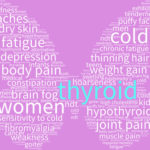There is a wide variety of endocrine and immune disorders that can wreak havoc with your menstrual cycle. The list of potential symptoms of this broad category include: irregular periods, fatigue, weight gain, hair loss, acne, emotional instability, intra-menstrual bleeding, pain during menses, infertility and recurrent miscarriage. The following is a description of common (but by not means exhaustive) list of syndromes that affect menstruation:
Endometriosis
 Ugh! Its that time of the month again! For some women this means abdominal pain, low back pain, heavy bleeding, spotting, and mood changes. These are all symptoms of the endocrine (and some believe an immune disorder), endometriosis. Endometriosis affects millions of women of childbearing age. What’s more, over half of these women experience fertility difficulties. Some women with endometriosis experience persistent, severe menstrual cramping and spotting throughout the month – especially a few days before their period…while other women have no symptoms at all except infertility.
Ugh! Its that time of the month again! For some women this means abdominal pain, low back pain, heavy bleeding, spotting, and mood changes. These are all symptoms of the endocrine (and some believe an immune disorder), endometriosis. Endometriosis affects millions of women of childbearing age. What’s more, over half of these women experience fertility difficulties. Some women with endometriosis experience persistent, severe menstrual cramping and spotting throughout the month – especially a few days before their period…while other women have no symptoms at all except infertility.
“Personally I had been dealing with horrible cramps for all my post-puberty years, long having thrown in the towel, I was in her office for another issue and was greatly amazed when my cramps were gone with one session! This was after having tried several other acupuncturist, conventional and alternative medicine. I have sent several other people to her who have always gotten amazing results, she is a gem! Thanks Dr.Rozenn!”-A very happy patient, Santa Cruz
Endometriosis Signs/Symptoms & Risk Factors
- Painful periods
- Intense cramping may start 1-2 days prior to menstruation and can be so severe that it causes vomiting, diarrhea and fainting
- Pain at the end of, or just AFTER menses
- Irregular and/or anovulatory cycles
- Irregular spotting
- Painful intercourse
- History of sexual abuse
- High levels of stress
- High serum levels of prolactin, cortisol and/or the presence of autoantibodies
- Prior use of intra-uterine devices (IUDs)
- Close female relative with endometriosis
- Infertility
Polycystic Ovary Syndrome (PCOS)
PCOS is  very common, affecting between 5-10% of reproductive age women. In fact, it is the most prevalent cause of anovulatory (no ovulation) infertility in the developing world. However, it is difficult to say exactly how widespread PCOS is because this syndrome is so complex. After much debate, in 2003, Western experts reached a consensus on the defining signs and symptoms of PCOS. In a meeting between the European Society of Human Reproduction and Embryology (ESHRE) and the American Society for Reproductive Medicine (ASRM) the definition of PCOS was set as being: two out of three key symptoms: infrequent or absent menstrual periods, specific hormonal imbalances and polycystic ovaries.
very common, affecting between 5-10% of reproductive age women. In fact, it is the most prevalent cause of anovulatory (no ovulation) infertility in the developing world. However, it is difficult to say exactly how widespread PCOS is because this syndrome is so complex. After much debate, in 2003, Western experts reached a consensus on the defining signs and symptoms of PCOS. In a meeting between the European Society of Human Reproduction and Embryology (ESHRE) and the American Society for Reproductive Medicine (ASRM) the definition of PCOS was set as being: two out of three key symptoms: infrequent or absent menstrual periods, specific hormonal imbalances and polycystic ovaries.
Infrequent or Absent Menstrual Periods
Most women with PCOS don’t completely stop menstruating. They tend to have long cycles with 6-8 menstrual periods per year. This is due to infrequent ovulation, which of course decreases the likelihood of conception.
Hormonal Imbalances
Women with PCOS are locked into the follicular phase. They make eggs, in fact they make A LOT of eggs, but they can’t ovulate them. Biochemically this can manifest as too little estrogen, too much testosterone, high LH, low sex hormone binding globulin (SHBG) as well as many other endocrine abnormalities. These hormone irregularities can cause problems beyond infertility. Because of their negative effect on the quality of developing eggs, they can increase the chances of miscarriage.
Several theories exist as to why some women develop these hormonal imbalances. The tendency could be inherited. Indeed, women with close female relatives with PCOS are at higher risk for developing the disorder. Current thinking asserts that women who are prone to developing PCOS are also more likely to have blood sugar abnormalities. It is a vicious cycle where one problem gives rise to and exacerbates the other. Women with PCOS may have defective insulin receptors, leading to faulty blood sugar management. This may cause high insulin to drive testosterone and DHEA-S to abnormally high levels. Loss of head hair, increased facial hair and acne may occur. In addition, these women may suffer from weight gain, increased fat storage, cortisol dysregulation and irregular menstrual cycles.
The String of Pearls
The last definitive criteria of PCOS is polycystic ovaries. An ultrasound will show 12 or more small cysts (remember these aren’t really cysts in the true sense, they are immature follicles containing eggs) which look like a string of pearls sitting on top of the ovaries.
Intra-menstrual Bleeding (bleeding randomly during the cycle)
Unlike women with PCOS, these women have a difficult time stopping bleeding! They may bleed for a few days after ovulation. Or, what is worse is that the bleeding may come randomly throughout the month. There are many, many Western disorders that can have this symptom, yet often, after a battery of tests, the bleeding remains it is unexplained. Women with this condition can be so frustrated, and tired. It is hard to bleed all the time!
Thyroid Ups and Downs
 The thyroid gland sits in the front of your throat. It controls your whole body’s metabolism—the metabolic activity of EVERY CELL! Because of this, thyroid disease affects every organ in the body, including reproductive organs.. Thus, if your thyroid is not healthy, your menstrual cycle could suffer. This can even lead to infertility. The endocrine system is one big balancing act. You can have too much thyroid hormone or too little.
The thyroid gland sits in the front of your throat. It controls your whole body’s metabolism—the metabolic activity of EVERY CELL! Because of this, thyroid disease affects every organ in the body, including reproductive organs.. Thus, if your thyroid is not healthy, your menstrual cycle could suffer. This can even lead to infertility. The endocrine system is one big balancing act. You can have too much thyroid hormone or too little.
There is an art and a science to reading thyroid laboratory results. I can not count the number of patients who come to me with irregular periods, anxiety, weight gain, infertility or recurrent miscarriage who said that their doctor tested their thyroid and it was “fine”. I have learned that I always, always need to see the laboratory tests to determine what “fine” means. Often times, “fine” is not optimal. Without optimal levels of thyroid hormone, women (and men) can have very uncomfortable symptoms.
Hypothyroid Signs/Symptoms
- Weight gain and/or difficulty losing weight, even with dieting and exercise
- Tendency to be cold
- High cholesterol
- Hair loss
- Depression
- Dry skin
- Memory & concentration difficulties
- Constipation
- Menstrual irregularities such as: unpredictable cycles, heavy bleeding and a history of miscarriage or stillbirths
Hyperthyroid Signs/Symptoms
- Unexplained weight loss
- Anxiety
- Insomnia
- Restlessness
- Shaking
- Thirst
- Exopthalmos (an eye condition resulting in bulging and irritation)
- Shortness of breath
- Irregular periods
- Infertility
All of these endocrine problems can cause menstrual difficulties. They are complex issues which often do not have ONE particular cause, thus treatment must be comprehensive and individualized. This is the realm in which Oriental medicine excels. These issues require a wide perspective. Only by looking at the whole picture, we can get to the root of the problem and effect changes in ways most patients did not think was possible.
Whether your goal is to get pregnant, regain control over your cycle, or eliminate PMS symptoms, Dr. Rozenn can provide comprehensive Eastern and Western diagnostics and assemble an individualized treatment plan to meet your needs.
What are you waiting for? Schedule your appointment today!

